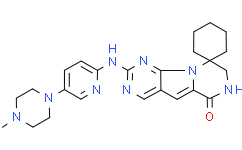| Description: |
Trilaciclib is a CDK4/6 inhibitor with IC50s of 1 nM and 4 nM for CDK4 and CDK6, respectively. |
| In Vivo: |
Trilaciclib (G1T28) treatment results in a robust and dose-dependent suppression of proliferation in HSPCs at 12 hours, with EdU incorporation returning near baseline levels in a dose-dependent manner by 24 hours after administration. These data demonstrate that a single oral dose of Trilaciclib can produce reversible cell-cycle arrest in HSPCs in a dose-dependent manner in vivo. Mice given 100 mg/kg Trilaciclib 30 minutes prior to etoposide treatment, exhibits only background levels of caspase-3/7 activity. These data demonstrate that Trilaciclib can protect the bone marrow from chemotherapy-induced apoptosis in vivo. The data demonstrate that treatment with Trilaciclib prior to 5-FU likely decreases 5-FU-induced damage by chemotherapy in HSPCs, thus accelerating blood count recovery after chemotherapy[1]. |
| In Vitro: |
Incubation with Trilaciclib (G1T28) for 24 hours induces a robust G1 cell-cycle arrest (time=0). By 16 hours after Trilaciclib hydrochloride washout, cells have reentered the cell cycle and demonstrate cell-cycle kinetics similar to untreated control cells. These results demonstrate that Trilaciclib causes a transient, and reversible G1 arrest. A transient Trilaciclib-mediated G1 cell-cycle arrest in CDK4/6-sensitive cells decreases the in vitro toxicity of a variety of commonly used cytotoxic chemotherapy agents associated with myelosuppression[1]. |
| Kinase Assay: |
HS68, WM2664, and A2058 cells are treated with 300 nM Trilaciclib (G1T28) or DMSO (0.1%), for 4, 8, 16, or 24 hours. Whole cell extracts are prepared using 1× radioimmunoprecipitation assay buffer containing 1× HALT protease and phosphatase inhibitors. Total protein concentration is determined by using the kit, according to the manufacturer's instructions. For Western blot analysis, protein is processed as described previously. Antibodies to total RB andβ-tubulin run as a loading control are assessed[1]. |
| Cell Assay: |
HS68 cells are treated for 24 hours with Trilaciclib (G1T28) at 10, 30, 100, 300, 1,000, or 3,000 nM final concentration. Cells are harvested and fixed in ice-cold methanol. Fixed cells are stained with 20 μg propidium iodide, 50 μg RNAse A in PBS-CMF (calcium magnesium free)+1% BSA, Fraction V. Samples are processed on Cyan ADP Analyzer, and cell-cycle analysis is completed using software[1]. |
| Animal Administration: |
Mice[1] Female athymic nude mice are implanted with H69 cells and monitored until treatment initiation. Once tumors reach an acceptable size (150 mm3), mice are dosed in various combinations of Trilaciclib (100 mg/kg) and topotecan for 5 days per week for 4 weeks. Tumors are measured for up to 60 days after treatment. All mice that reach excessive tumor burden before 60 days are humanely euthanized. Topotecan and Trilaciclib levels in blood plasma from the mice treated with Trilaciclib hydrochloride and/or topotecan are processed and analyzed using established methods . |
| References: |
[1]. Bisi JE, et al. Preclinical Characterization of G1T28: A Novel CDK4/6 Inhibitor for Reduction of Chemotherapy-Induced Myelosuppression. Mol Cancer Ther. 2016 May;15(5):783-93. |






















